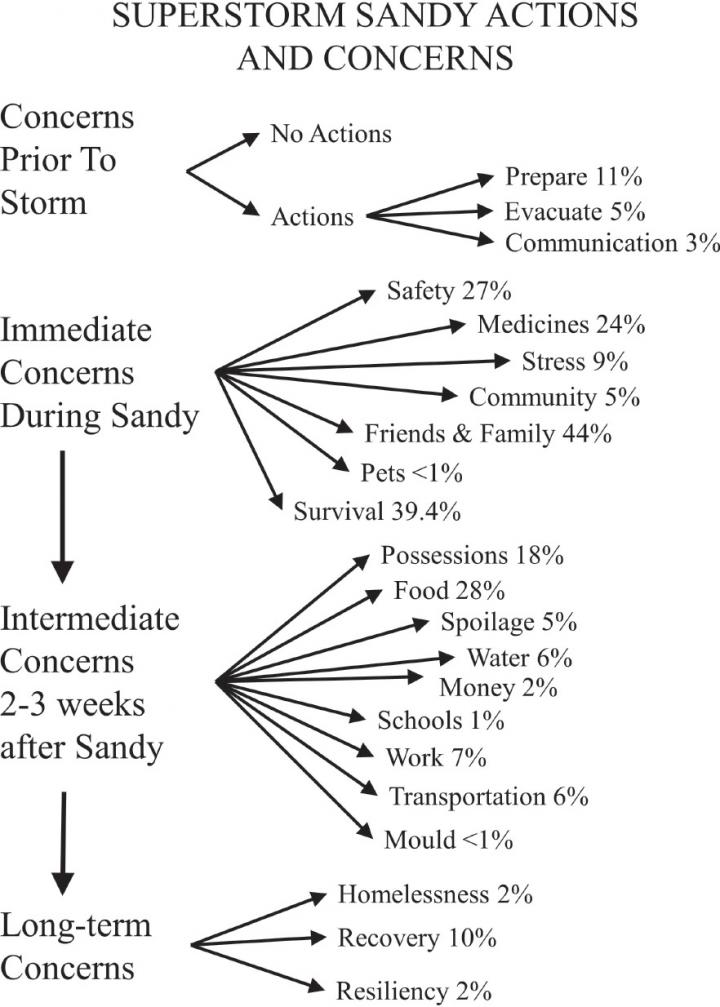Interviews with economically disadvantaged New Jerseyans in the areas hardest hit by Superstorm Sandy yield advice for future disasters

Credit: Joanna Burger, Michael Gochfeld, Clifton Lacy
Governments seeking to help their most vulnerable residents prepare for hurricanes and other disasters should create community-based information campaigns ahead of time, according to a Rutgers study of economically disadvantaged New Jerseyans in the areas hardest hit by Superstorm Sandy.
The study, published in the journal Disasters, found that 65 percent of economically vulnerable Sandy survivors intend to take active steps to protect themselves and families in advance of the next major disaster. Those steps include evacuating early or purchasing necessary supplies. Emergency response agencies can help by working with churches and other community organizations to learn about specific needs, such as transportation issues, in lower-income communities, the researchers found.
The researchers, at multiple Rutgers University-New Brunswick and Rutgers Biomedical and Health Sciences institutions, interviewed 599 people at federally qualified health centers, which serve uninsured and underinsured residents, in the counties most heavily damaged by Sandy. The 2019 Atlantic hurricane season begins June 1.
“When governments create disaster response strategies, it is essential that they understand how people in affected communities will actually prepare for and experience these events,” said lead researcher Joanna Burger, a professor of biology at Rutgers-New Brunswick’s School of Arts and Sciences, the Rutgers Environmental and Occupational Health Sciences Institute and the Rutgers School of Public Health. “Our study of economically vulnerable individuals affected by Hurricane Sandy yields important tips on how emergency planners can prepare for disaster impacts in underprivileged communities.”
Some respondents said small grocery stores in their neighborhoods ran out of canned goods and water before Sandy’s arrival, which made post-storm conditions more difficult. Some said they went to shelters that were under-equipped to provide appropriate food for people with diabetes, or that children with asthma were stuck in water-damaged residences with increasing mold problems.
Citing the respondents’ experiences before and after Sandy and their concerns about future disasters, the report offers the following recommendations for emergency planners seeking to help economically vulnerable residents:
- Reach out to community organizations well before the next crisis, and work to create community focus groups to identify local needs. A community with few cars, for example, could establish transportation contingency plans.
- Public awareness campaigns should provide advice on how people can look after their loved ones during a disaster, such as identifying a designated meeting place, in addition to obvious advice about stocking up on batteries, food and water.
- Awareness campaigns should offer advice on maintaining health and safety in the weeks after a long-term disaster.
- Provide information before, during and after a disaster in languages other than English, and via multiple forms of media.
- Provide more evacuation shelters that are better equipped to meet the needs of people with health-related or other dietary restrictions.
- Provide a method to check on senior citizens and on undocumented residents who may be afraid to seek help.
“Government and non-governmental agencies can consider these insights now – that is, before the next hurricane. Many of these ideas could be implemented easily. It was enlightening to learn that the majority of respondents plan to take personal action to reduce their risk, and are prepared to listen to governmental advice on how to protect themselves and their families,” Burger said.
###
Also contributing to the study were Michael Gochfeld, professor emeritus at Rutgers Environmental and Occupational Health Sciences Institute and Rutgers Robert Wood Johnson Medical School, and Clifton Lacy, professor at the Rutgers School of Communication and Information and at Rutgers Robert Wood Johnson Medical School.
Media Contact
Neal Buccino
[email protected]
Original Source
https:/
Related Journal Article
http://dx.




